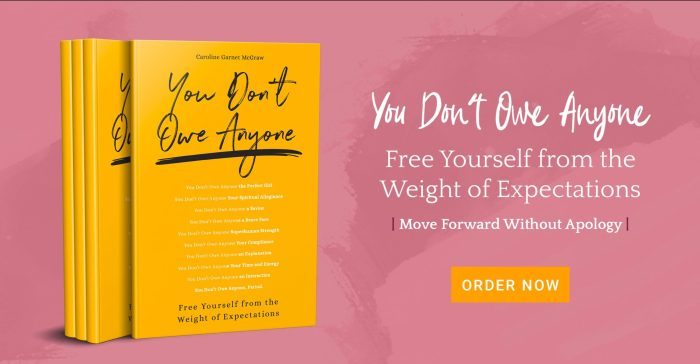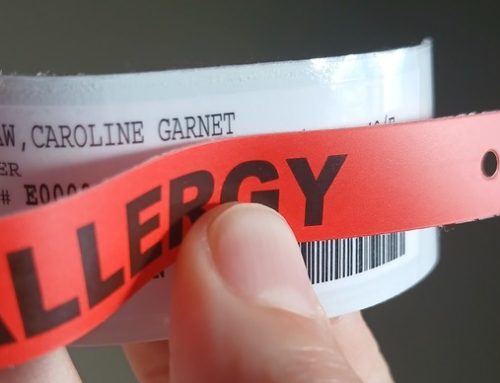About 20 years ago this Christmas, I pretended I was fine when really I was furious.
The guy I call Harley in my first book, You Don’t Owe Anyone – the co-worker who begged me to go out with him – had abruptly broken things off months ago. He told me he was sorry, but he still had feelings for his ex.
This was hard to hear, and harder to recover from. Since we worked together, we still saw each other every day. And we had the same friend group, so we spent time together outside of work, too.
This was not ideal, because it kept euphoric recall alive for me. Though we’d only dated for a short time, I looked at our summer romance through rose-colored glasses. Everything had been so great! Why couldn’t we just go back to the way things were?
Instead of moving on, I held out a stubborn hope that if I could just be the perfect “friend” to Harley, then he’d see the light and be in love with me again.
(Did you ever become more attached to someone after they left or treated you poorly? Me too, it’s a thing! Look up limerence and trauma bonding.)
When Harley offered to pick me up from the train station on Christmas eve 20 years ago, that awful hope of mine got stronger. He seemed so happy to see me. He made me a cup of tea. He sat next to me in a room lit only by the Christmas tree … then told me he’d gotten back together with his ex.
I felt so stupid, so naive. So I swallowed my immense anger. I told him that was great, congratulations. And then I went upstairs and decided that I was going to drown myself in work.
My thinking was: I cannot cope with this, and I cannot see a way out. So I will just work harder and need less. I will deny myself until I disappear.
So I gave until I dropped, literally, with a case of shingles so bad the doctor flinched and turned away. I was 22 years old, fighting so hard to return to happiness that I was making myself miserable.
What is a euphoric recall in a relationship?
Euphoric recall is a well-known cognitive bias, a tendency to remember the past as better and more perfect than it actually was. Euphoric recall paints the past in a more positive light than the present. It effectively blunts the edges of hard times, softening the story of the past.
In short, it’s about idealizing and romanticizing the past.

In summer’s heat, winter starts sounding great! We engage in euphoric recall every year, forgetting how uncomfortable it is to bundle up kids and navigate an ice storm.
Sounds nice, right? Not so fast; while some instances of euphoric recall are relatively harmless — think of the aged football player remembering his “glory days” while effectively forgetting all of the grueling workouts — other types can get us into a lot of trouble.
Euphoric recall forms a big part of addictive behaviors; it tells us that if we just go back to the substance or habit just one more time, then we’ll feel the same thrill we felt at first. And though I’ve never been addicted to drugs or alcohol, I do know what it’s like to be hooked on a feeling.
Euphoric recall made me desperate to get back together with Harley, to return to a relationship that wasn’t actually healthy in the first place.
You see, in the first telling of that story, I gave you the rose-colored glasses version. I left out a few important facts: that when we met, he’d pursued me with an intensity that felt like too much, too fast.
For example, he revealed super-personal details in our first conversation. He wanted to be “official” very quickly. He asked to meet my family after just a few weeks of dating.
It was pretty textbook love-bombing, but I didn’t see it that way back then. A large part of this was a lack of education — I didn’t know which red flags to look out for, and I’d been trained out of trusting my gut. Since I don’t want that to happen to you, we’ll come back to that topic at the end of this post.
First, though, I want to acknowledge the other part of the issue: love-bombing feels great while you’re in the middle of it! Especially if you’ve experienced abuse or neglect in childhood, being on the receiving end of so much adoration feels amazing.
How long does euphoric love last?
In my experience, euphoric love lasts until something breaks the spell. So while timelines do vary, something always breaks the spell eventually. A relationship that’s based only on the highs can’t withstand the lows.
This is why some of us work so hard never to drop a single ball. Deep down we know that if we did stop trying so hard, it would break the spell, and we don’t think we could bear it. So we deny ourselves and hustle hard to avoid the reckoning.
Do you recognize yourself in this description? Is your default setting, “I should be doing more”? Have you used work and busyness like a drug? If so, you’re not alone. Staying stuck in self-denial is a big issue in this community.
As one reader wrote to me:
“It’s the self-denial / starving habit [that’s a constant for me]. I’ve noticed that this seems to just move – at first it was food, then it’s with money, and it can be with relationships and doing things I enjoy.
Even if I do those things, I restrain myself and can’t fully “be” there. I did [go to Italy like I’d been longing to] – and yet, it was like I was watching myself.”
This is SO understandable! Most of us spend years dissociated from ourselves, because our real feelings seem unbearable. And then we wonder why we can’t be present and actually enjoy our lives.
So how do we solve for that? How do we come out of constant self-denial? How can we can fully be there? It starts with the decision to know what we know and feel what we feel. To stop living in denial and start living in reality.
That Christmas 20 years ago, I pretended to be fine when my anger was big enough to light a house on fire. Back then, I didn’t know how to feel anger without being destructive, so I did the only thing I could do at the time: I turned it inward.

After the breakup, I chopped off my hair.
(Did you know that one definition of depression is “anger turned inward”? That explains a lot, doesn’t it?)
When we don’t know how to handle our anger, we turn it inward. But this is really painful, so then we need to numb the pain with overwork, or overgiving. Here’s the thing about healing, though: We don’t need to spend a lot of time and energy trying to stop the overwork and overgiving.
Why not? Because those patterns are just the symptoms of a deeper problem.
The more efficient way to heal is to turn our attention to the underlying core issues: the unprocessed anger, trauma, grief, and hopelessness. When we know how to heal those core issues, our coping mechanisms start to fall by the wayside.
Here’s the concept in a nutshell: “When we apply love to the parts of ourselves that hurt, we heal.” So, your first and most important task is to apply love to those hurting parts.
This work is best done with a good therapist and/or coach, because that which is injured in relationship is best healed in relationship.
That said, here are a few of the pieces that you’ll need:
- Start embracing imperfection by looking at yourself as a compassionate witness.
- Practice reparenting yourself (the most essential skill nobody taught you).
- Learn how to forgive yourself for past mistakes.
These inner work practices help you to build a solid foundation; they shore up your psychological well-being. Once you know how to love and accept yourself, your fear of other people’s judgment goes way down.
How to Counteract Euphoric Recall
My experience in coaching hundreds of clients is that most people have at least one person in their lives who wreaks havoc on their heart. Of course, I want to spare them more pain, and reading up on emotional abuse as a great place to start.
However, I also know that we can’t avoid all dysfunctional relationships. We’re going to be in some of these relationships simply by virtue of being alive on this planet! Be it a parent, sibling, relative, close friend, coworker, or boss, people with personality disorders are more common than you think.
As of this writing, 9.1% of the U.S. population has a diagnosed personality disorder. And remember, that’s just people who are diagnosed! Plenty more people have these disorders without a diagnosis.
Dr. Ramani Durvasula, a world-leading expert on narcissism, estimates that up to one in six people are narcissistic. Most of these people will never be formally diagnosed, some because they exhibit milder forms of narcissism, others because they will not seek therapy or help.
Typically the people who seek help from therapists, counselors, and coaches are the ones who are desperately trying to make relationships work with these borderline and narcissistic folks!
Since I’d experienced this in my own life – and had so many coaching clients coming to me with these issues – I became very interested in learning everything I could about it. So while I’m not a clinician or a therapist, I can tell you that I’ve spent hundreds if not thousands of hours learning from the best in the field.
Here’s an excerpt from a masterclass I taught, Go For Your Goals with Confidence (Even When Loved Ones Don’t Support Your Growth). In this segment, I talk about how to decide what to do when there’s a disordered personality in the room.
(Quick correction: David Seabury first published The Art of Selfishness in 1937, not in the 1960’s. My reprint edition is from the 1960’s.)
To make this even more concrete: Here’s one of the most helpful exercises I’ve come across to counteract euphoric recall. It’s simple, yet very powerful. Here’s what to do.
Write down the awful things that happen, ideally right afterward, to ensure that you remember them accurately.
This does a few great things for you:
- The act of writing things down on paper helps you to form memories more easily.
- Writing down the worst of times helps to counteract euphoric recall, because it’s harder to look away from a record of what happened.
- Last but not least, this process is useful because people with unhealthy personalities will often try to rewrite the past. They will claim that their abusive actions “never happened” when they very much did. Again, having a written record helps you to stay grounded and sane.
Remember, this is not you “being bitter” or “unforgiving.” Rather, it’s you counteracting a common cognitive bias! It’s simply a corrective force for euphoric recall. Also, as you write, please remember the difference between an isolated incident and a repeated pattern.
Are you someone who regularly ices people out, flies off the handle, or lies to those who love and trust you? If so, please get help to stop hurting others.
Are you someone who is horrified at the very thought of hurting another living being, who beats herself up for any mistakes? If so, please get help to stop hurting yourself.
If you didn’t write down the bad things that happened right afterward, it’s OK; I have a structure that will help spark your memory. Take the “four pillars of narcissism” and list examples of how you’ve seen them show up in your relationship.
Euphoric Recall and Narcissists
Why narcissism? It’s more common than sociopathy and psychopathy, so you’re more likely to run across it in your daily life. Additionally, many of the traits of narcissism also show up in the more dangerously-disordered personalities.
According to Dr. Ramani Durvasula, the four pillars of narcissism are:
- Lack of empathy
- Grandiosity
- A chronic sense of entitlement
- A chronic need to seek out admiration and validation from others.
I’ve included a few examples from my own life – I didn’t even have to dig into my coaching notes to come up with examples, which should tell you something about how common it is to encounter folks like this.
What examples of lack of empathy have you seen? Here are a few I’ve encountered…
- Driving erratically and/or aggressively
- Giving the silent treatment, or suddenly ghosting an important relationship (when there’s no abuse involved)
- Telling other people that they ought to suffer needlessly because it’s somehow more spiritual
- Avoiding or shunning people with disabilities, or people of other races
What examples of grandiosity have you seen? Here are some examples I’ve run across…
- Declaring that they must be mega-rich and mega-successful
- Adhering to the belief that their religion is the only way to God, or that their particular denomination is the “one true church”
- Expecting other people to wait on them – literally or metaphorically
- A traveling companion who balks at being asked to do a share of trip coordination
What examples of a chronic sense of entitlement have you seen? Here are a few I’ve seen in the wild…
- Refusing to make plans and coordinate efforts, showing up significantly late, or keeping others “on the hook” emotionally.
- Letting animals roam free regardless of the risk to others, not obeying leash laws
- Lying repeatedly, twisting the truth while insisting that others be completely honest
- Being offended when they’re not first to hear important news.
What examples of a chronic need to seek out admiration and validation from others have you seen? Here are some I’ve bumped into…
- Being in constant contact with others: texting under the table at meals or meetings, ignoring the people present
- Frequently and/or easily discarding friends and partners to seek new sources of supply
- Insisting on certain status symbols to signal one’s importance (i.e. huge, gas-guzzing vehicles), even when doing so causes harm to others and the planet
- Posting brags, humblebrags, or pity-seeking posts consistently on social media
Where to go from here?
OK, so let’s say you’ve reviewed this list and you’re recognizing a lot of similarities with your lived experience. Once you notice that something’s way off in one of your relationships, what do you do? Your first and most important task is what Dr. Ramani Durvasula calls radical acceptance.
Radical acceptance means that you surrender to the reality of the way things are, and give up the hope of the other person changing or the relationship getting better. Radical acceptance sounds like this:
I cannot change this person. They do not have the capacity to be in a healthy relationship. And most likely, that will never change. This will not be a healthy relationship no matter how much I wish or how hard I try. There is no fixing or saving the relationship. There is only mourning the loss.
If you glean nothing else from this post, remember this: There are people in life who cannot love you in an open, honest, authentic way. It’s just not possible for them…at least, not in this lifetime.
It’s a really hard thing to acknowledge that there are people you love who just do not have the capacity to love you back.
And, at the same time, this awareness can lead to healing, because it helps you to see that you’re not crazy, and it’s not your fault that your efforts to make things better haven’t worked.
On a deeper level, you already know this. You already know that they aren’t able to meet you in a healthy relationship. And unless they undergo intense therapy and do daily work on themselves – which is extremely unlikely – they will not be able to meet you in a healthy relationship.
Why not? Because they don’t believe they have a problem. This is crucial: Someone with an unhealthy personality style will always locate the problem outside of themselves. It’s the weather, it’s my neighbor, it’s my spouse, it’s the government.
They do not have the ability to go within and look at how their own choices are contributing to their discontent.
Given all of this, your goal with regards to them needs to change. Previously, your goal was to create a loving, safe, healthy relationship.
When you recognize that this is impossible and come to a place of radical acceptance, your goal becomes: Take care of yourself. Set stronger boundaries. Give less of yourself to the relationship, not more.
You go from thinking, “Oh, I wish we could be closer,” to, “I will protect myself.” Frankly, it’s not safe for you to open up to someone with an unhealthy personality style, because they will use your vulnerabilities against you.
They may or may not harm you physically, but they will tear you down mentally, emotionally, and spiritually. And this matters. You matter.
If you want to believe that but don’t really feel it yet, that’s OK – I’ve been there. For now, just consider the possibility: What would it be like to live as though my happiness and well being really mattered?
What would it be like to free myself from the weight of expectations, and move forward without apology?
If that resonates, get a copy of my book, You Don’t Owe Anyone.
In it, I share personal stories of how I came through emotional abuse and euphoric recall, and the exact exercises I used to help me heal.
When you share proof of purchase for the print book, ebook, or audiobook on this page, you’ll receive valuable bonus gifts, including these videos:
- I don’t want to hurt people, but I want to tell my story.
- How to make the needed changes without upsetting others?
- Were you ever afraid to let people know your story?
Share This:
Comments
Related Posts



